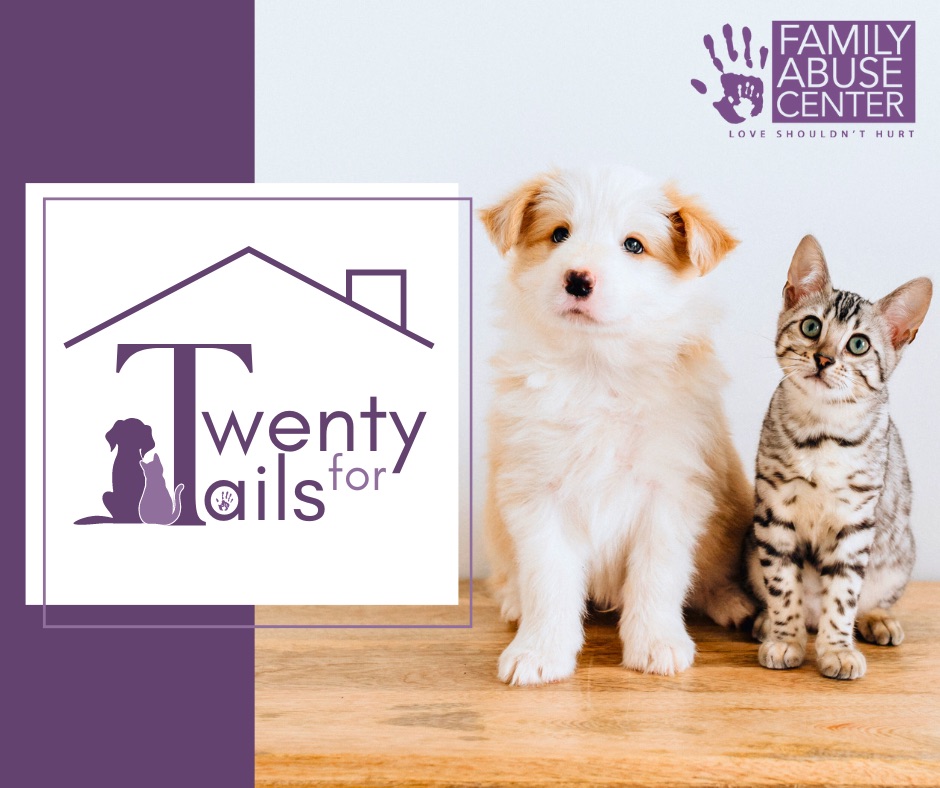Waterparks Open to the Public Mother’s Day Weekend
Moms are the heart of every household. They know what we need before we even ask. And they rarely ask for anything in return. To honor them, Hawaiian Falls Waco is inviting Moms to enjoy complimentary admission Mother’s Day weekend when the waterparks open to the public.

Photos by David Alvey
In addition to free admission, Moms will receive a special Hawaiian-themed gift (while supplies last) Saturday, May 13 and Sunday, May 14.
“We’re inviting mothers of all ages to come enjoy a day at the park to thank them for their selfless roles as cook, chauffeur, activity director, nurse, and countless other tasks they do for their families,” said Hawaiian Falls Marketing Director Ron Mckenzie. “We want Moms to enjoy a carefree day where others can wait on her. Float down the Lazy River and feel the stress melt away or recline in the shade and enjoy a cold drink while Dad races the kids down a slide. We want Mom to take away memories she’ll never forget.”
Hawaiian Falls will officially kick off the summer season with free admission to all active duty and retired military personnel with a valid Military ID Memorial Day Weekend, May 26 – May 29. The parks will be open daily beginning Friday, May 26.
Other special events planned throughout the summer include:
- Father’s Day weekend – Dads get in free June 17 – 19
- Champions Day – June 20 and July 22 Champions (individuals with special needs) and their families will have exclusive access to the park from 9 am -10 am. Champions tickets are FREE and family companion tickets are only $10 (limit 4).
- World’s Largest Swimming Lesson – June 22
- Independence Day weekend – Active duty and retired military personnel as well as first responders receive free admission.
- Aloha Fest – July 15 in Roanoke, July 22 in Mansfield, and July 29 in Waco.
- Family Fun Fridays throughout July with Ohana Games led by Hawaiian Falls Activity Director.
Season passholders can visit their home park to process their passes from 4 p.m. – 6 p.m. May 8 – 12 at the park’s front gate.
Hawaiian Falls Waterparks are located in Mansfield, Roanoke and Waco. More information about special events, operating hours, directions, tickets and season passes, are at hfalls.com.
By Andrea Zimmerman
It’s not news to anyone that foster care is in crisis. It seems we’ve become accustomed to this reality and even somewhat apathetic to it, probably because it is so overwhelming and simultaneously kept behind the doors of state offices.
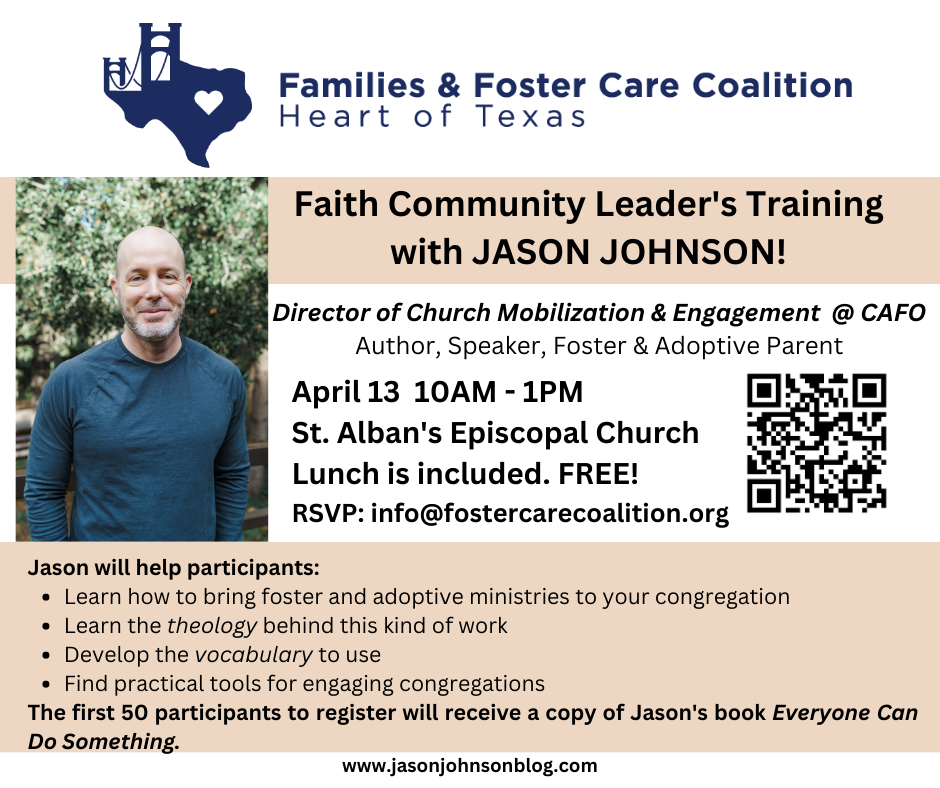
The State of Texas is changing this and has mandated that local communities confront the crisis among vulnerable families in their own communities by privatizing foster care with what is called Community Based Care. Under this model, CPS will handle investigations and removals, then a private agency will handle placements and case management.
Consequently, without the state’s placement network, children will no longer be sent to other communities with more resources and more foster homes. If you are asking, “Wait, we send children away?” The answer is “yes.” We send away A LOT of children and youth due to a lack of kinship support, foster homes, youth homes, and resources for complex needs.
In fact, of the approximately 450 children and youth whose cases originated in McLennan County, half are sent to other areas. Under Community Based Care, this will no longer be possible and our local community is expected to increase our capacity in every way to care for these children.
While this is a stunning and overwhelming change, if our community rises to this occasion and works together to care for our own children, keeping children close to home is proven to provide better long-term outcomes for both the child and the family of origin.
Keeping children and youth in their own communities means they remain close to their family of origin; they may stay in the same school and faith community and can maintain consistency in medical resources, not to mention their social structure. Older youth retain employment, schooling, and their support system. Proximity supports reunification efforts and enables the foster or kinship parent to provide support to the family of origin, as well.
This is a tall order for our community. We have a network of support in foster care, but we are stretched thin and have limited resources. We need help! We need more human and financial resources to make this work.
This doesn’t happen overnight, but the Families and Foster Care Coalition began efforts about a year ago to gather our resources and assess the landscape for this change. The needs are great, and we are working hard to increase capacity in our community.
One area that would help is the involvement of the faith community. While becoming a foster parent is a rare and unique call, becoming involved in the supportive work of foster care is a way the faith community could help in this crisis.
Kingwood Methodist Church, just outside Houston, shared a beautiful story of their work among youth in foster care in their community (watch or listen here). In that story, you can hear about Jason Johnson, who helped prepare their congregation for this work.
Jason will come to our Waco community April 13 to lead a faith congregation leader’s training workshop. This session will help equip leaders in the faith community with practical tools for starting the work of foster care in their congregations. This event is free, and childcare and lunch are provided. RSVP here.
This training workshop is the first step in preparing for this change headed our way. We would love for you to join us!
For more information about the Families and Foster Coalition, please visit:
Website: fostercarecoalition.org
Email: [email protected]
Find us on Facebook: Families and Foster Care Coalition
Find us on Instagram: ffcc_heartoftx
Andrea Zimmerman is coordinator of the Waco Families & Foster Care Coalition.
By Ferrell Foster
Families come in a variety of forms, and they serve varied personal and social services. One of the key functions of family is to nurture the growth and development of children by providing for a child’s basic human needs.
We all know, however, that some families become unable to provide the needed care for a child. When that happens the state steps in to protect the children, as it does in other circumstances where vulnerable persons are at risk.
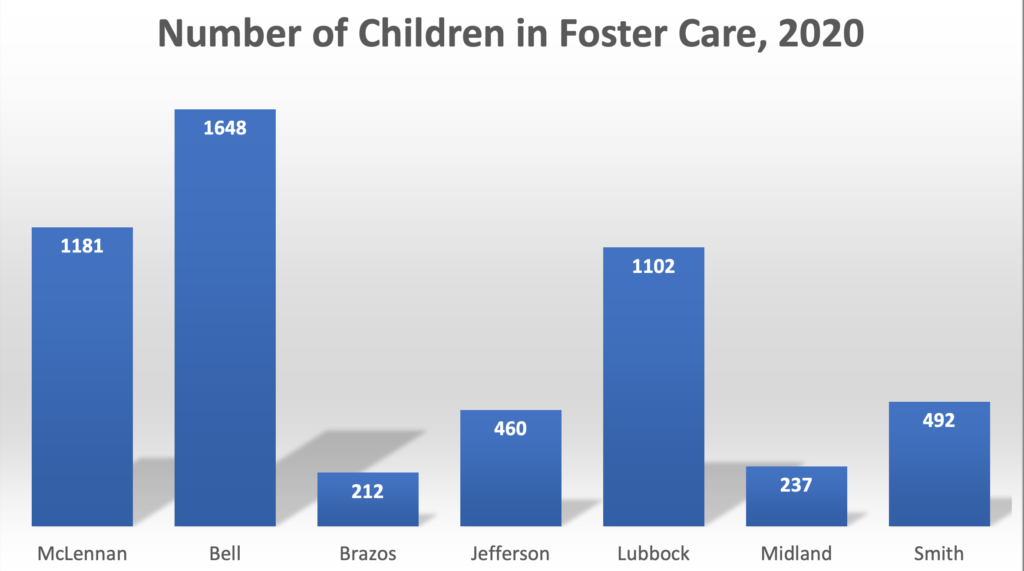
A number of things can happen when the state intervenes; one is by arranging foster care — a place to provide needed care to a child for a time. Kids may be placed in a number of possible settings — a relative’s home, a licensed foster home, or residential psychiatric care.
Foster care placements have been rising in many counties in Texas. In 2020, 1,181 McLennan County children were placed in foster care, a figure which has risen steadily over the past 10 years; there were 465 placements in 2011. These numbers reflect all children in the varied types of housing.
The placement number reflects the number of children in care at the beginning of the year and those who enter care during the year, said Anna Futral, executive director of CASA of McLennan County. On any given day there are about 700-800 McLennan County children under state supervision with relatives, licensed homes, or other residential facilities.
The rise since 2011 is staggering and should get our attention. Yes, our population has risen, but it has not nearly tripled, as have the placement numbers. This tells us that a lot of families are struggling to care for their children.
Are we any different from counties of similar size?
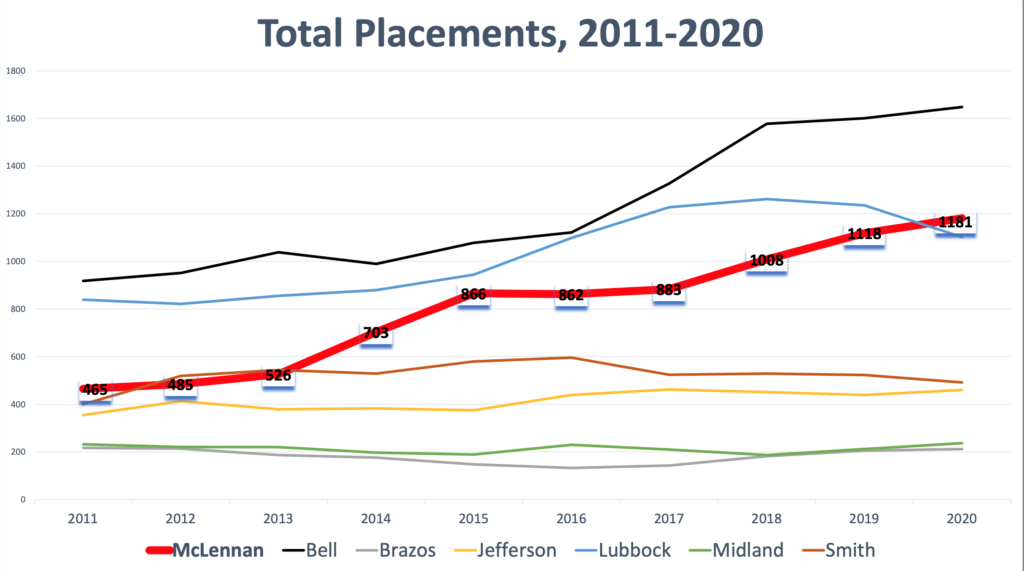
The rate of placement in McLennan County is 18.36 per 1,000 children. That means 1.8 percent of our children are needing state-supervised care. This is a higher rate than in similar counties — 16.5 per 1,000 in Bell, 4.21 in Brazos, and 7.6 in Jefferson.
The need for care points to a challenge on the family-of-origin side of the equation, but there is also a challenge on the foster care side. Last year, there were 17 licensed homes for foster care in our county. These homes typically house no more than two children.
“Many/most kids do get placed with relatives, which is a good thing,” Futral said, “but for those that don’t have safe relatives to be placed with, they are placed in licensed foster homes. But with so few licensed homes here locally, many children end up outside of McLennan.”
This resulted in only 35% of McLennan County children being placed in the county in 2020. That’s pretty consistent with other similar counties — 36% in Bell County, 35% in Brazos, and 33% in Jefferson. Lubbock County, which is similar in size, placed 51% within their county.
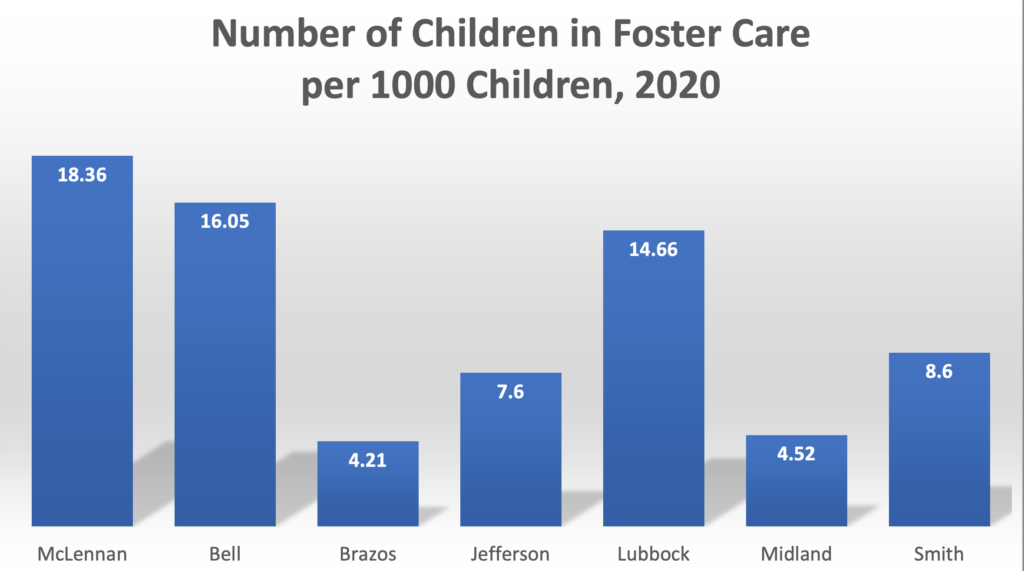
Enough of the numbers; you get the picture. Families need help, and the children in those families need help. Leaders in McLennan County have come together to pursue solutions — stress on the plural “solutions.” These things will not be improved overnight, but we have a lot of good people who care about pursuing that improvement.
If you would like to be involved, contact me at [email protected].
The data was compiled by Jeremy Rhodes of Prosper Waco from the Texas State Department of Family and Protective Services Data Book.
Ferrell Foster is senior specialist for care and communication with Prosper Waco. He is also acting executive director of Act Locally Waco.
The Act Locally Waco blog publishes posts with a connection to these aspirations for Waco. If you are interested in writing for the Act Locally Waco Blog, please email Ferrell Foster at [email protected].
By Ferrell Foster
Doing family is not easy. Families have struggles. Anyone who grew up in a family — all of us — know this truth. But sometimes those struggles become so difficult or dangerous that children need to be protected. That’s when the state steps in, and that’s when the whole community needs to step in, as well.
Forty-two leaders in McLennan County met Sept. 24 to form a new strategic working group — the Families & Foster Care Coalition. Waco Mayor Dillon Meek provided the impetus for this meeting, asking Prosper Waco to convene those who are working in varied sectors to address the challenges faced by families and children in foster care.
Texas is in the midst of a crisis related to foster care, and Waco is no exception. Children are having to spend the night in local Child Protective Services offices because there are no places to take them. This is not the fault of CPS and its workers; it is caused by inadequate human, community, and financial resources.
Local leaders, however, are committed to disrupting the status quo; they believe we can do better if we work together. It is uncertain exactly what varied actions this new coalition will pursue, but we are rising up to make a difference.
Anna Futral, executive director of CASA of McLennan County, has agreed to chair the coalition’s steering committee. Anna has been seeking such community-wide action for some time and is well-prepared to lead. (CASA stands for Court Appointed Special Advocates. CASA trains volunteers to advocate for abused and neglected children in the foster care system.)
It is tempting to think of these issues as only a state government matter, but government agencies are not families, and these kids need families and all the care that should go with such relationships.
State-approved families that can provide foster care step into the gap. They become a child’s new place of safety and nurture for varied amounts of time as issues with the families of origin are worked out. But foster families and families of origin need support from community networks.
In addition to the state agency services and families providing foster care, there is a critical legal system to protect the rights of children, parents, and other relatives. Judge Nikki Mundkowsky and Judge Gary Coley are two who seek to guide this court system with eyes on both legal matters and human concerns.
Then multiple attorneys provide the proper legal representation to the children and families.
In short, it is a multifaceted system that seeks to look after the needs created by families and children in crisis. In Greater Waco, leaders realize we need a more cohesive response to the situation. We need more communication, planning, and implementation. We also need more people and organizations to work together for these children and families.
If you or your organization would like to become involved in this collaborative effort, please reach out to me via email — [email protected].
As an African proverb says: It takes a village to raise a child.
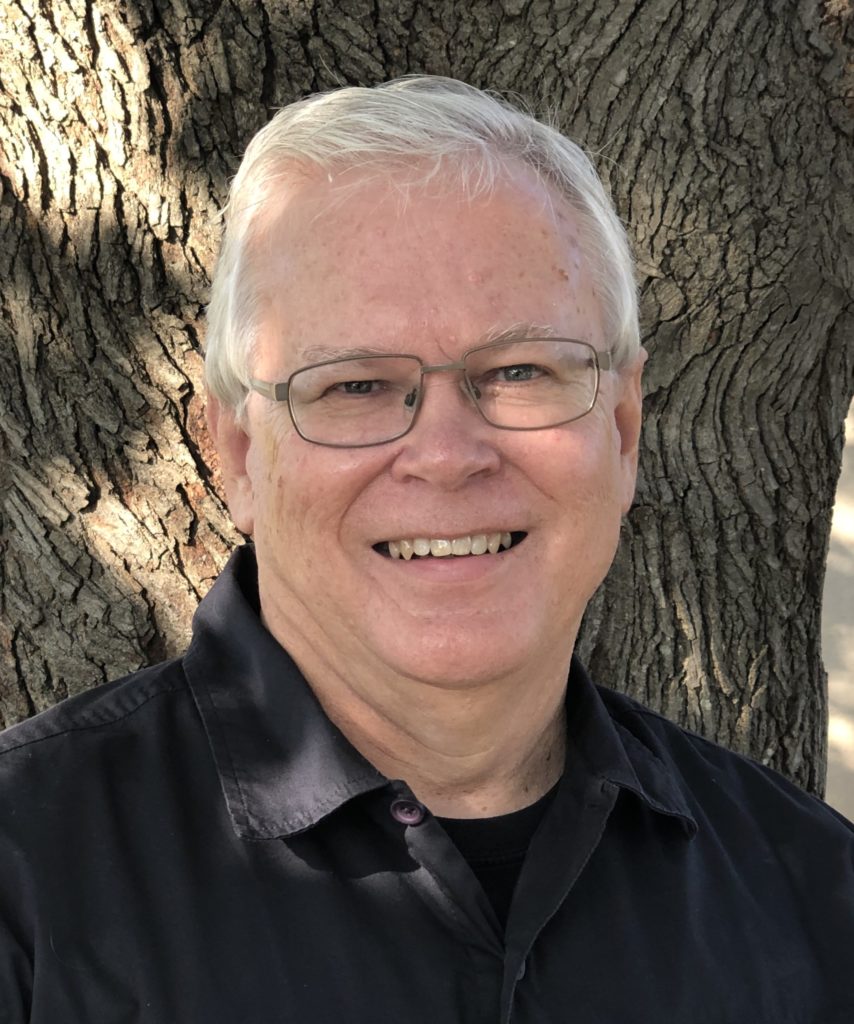
Ferrell Foster is senior specialist for care & communication with Prosper Waco. He is also acting executive director of Act Locally Waco.
The Act Locally Waco blog publishes posts with a connection to these aspirations for Waco. If you are interested in writing for the Act Locally Waco Blog, please email Ferrell Foster at [email protected].
by Leah Gorham, MAMFC, LPC
In early March, a Waco man was arrested for allegedly hitting a child in the face. The story was followed with additional arrests in other instances involving individuals who had sexually abused different children. According to the Children’s Advocacy Centers of Texas, 185 children in the state of Texas become victims of abuse each day. That is a staggering statistic that keeps me wanting to serve and empower more families. April is Child Abuse Awareness and Prevention Month and the Child-Safe Alliance is making efforts to reduce and eventually end all types of child abuse. STARRY is honored to partner with them by providing free counseling for children and families as part of the DFPS STAR program.
Child abuse prevention is a cause that is near and dear to my heart. I work with its victims on a daily basis and have become an advocate for child abuse prevention since I was a child. I remember being in elementary school when I first realized people were capable of hurting others. While some may call it “discipline,” leaving bruises and marks is never okay. Raising kids is difficult when you’re constantly being mom-shamed on social media for letting your kids eat that extra piece of candy. (Mostly because you’re so tired of the constant whining and screaming and all you want is a little peace and quiet!) Besides, we tell ourselves, My parents did that and I turned out okay. But … did we really? The only way to change the next generation is to do a little self-work. And the result could have a HUGE impact in the lives of our children.
What is one way to help families reduce the risk of child abuse and sharpen their parenting skills? I’m glad you asked! Trust-Based Relational Intervention® (TBRI®) is the brainchild of Dr. Karyn Purvis and TCU. From her research, Dr. Purvis found that empowering, connecting, and correcting children can help reduce child abuse and increase attachment and cohesion in families – especially children from hard places. Dr. Purvis published a book called Empowered to Connect, which I highly recommend you read. Over the next three weeks, I’m going to blog about the three principles outlined in the book and how to implement them into your life (with your current family or maybe your future family).
The first principle is empower. We all desire our children to succeed in life through their actions, education, emotions, relationships, etc. Empowerment focuses on using the child’s strengths and fostering a healthy view of self. Power struggles occur in relationships because we all desire to feel in control. Giving your child choices allows him or her to share the control. A word of caution helps set boundaries for the choices. Rather than saying that they can have any kind of snack after school, give them a choices of pretzels, veggie sticks, cheese crackers, or fresh fruit as options for the snack. It will help you keep your sanity and it’ll help you be able to say “yes” to more options. This will also build your child’s confidence in the fact that that they have power and can make good decisions. When kids feel in control of a few things, they are more likely to make better decisions and poor behaviors will likely decrease. There may be underlying issues too, so don’t be afraid to seek counseling for additional support. Next week, I’ll talk more about ways to connect with your child.
 Leah Gorham, MAMFC, LPC, is the Team Lead at the STARRY-Waco Counseling office that offers free counseling for children and families. She has been a Kid’s Hope Mentor for the past five years and is currently part of Leadership Waco.
Leah Gorham, MAMFC, LPC, is the Team Lead at the STARRY-Waco Counseling office that offers free counseling for children and families. She has been a Kid’s Hope Mentor for the past five years and is currently part of Leadership Waco.
The Act Locally Waco blog publishes posts with a connection to these aspirations for Waco. If you are interested in writing for the Act Locally Waco Blog, please email [email protected] for more information.
by Ellen Filgo
When my older son finally potty trained at age 3 years and 4 months, it was a relief to not have to change the diapers of my articulate, stubborn little boy who clearly could use the toilet (but just didn’t want to). It also meant that I no longer had two children in diapers. That’s right, our family had two in diapers for more than a year! It was a relief on our budget to save that money. Diapers are expensive. They can cost up to $100 a month per baby, which can stretch even a middle class family’s budget.
Now imagine you are the 1 out of 3 families in the country who struggle to afford diapers. There are 5.8 million babies in the United States aged 3 or younger who live in poor or low-income families. Not having enough diapers can mean that babies are left in soiled diapers longer or that parents re-use diapers that are meant to be single use. This can lead to health risks for the babies, such as rashes or infections. A clean supply of diapers is also required at the vast majority of childcare centers. If parents can’t provide them, they may not be able to enroll their children in early childhood programs, or even be able to enter the workforce themselves. Lack of access to diapers can sometimes hinder a parent in getting or staying employed at the job they need in order to become more financially self-sufficient.
There is no state or federal safety net program that allocates money for diapers. You cannot buy diapers with SNAP (food stamps) or WIC (a federal program that helps provide food for women, infants and children). Many existing social service organizations, focusing on hunger, homelessness, abuse or pregnancy try to provide diapers to the families they serve, but they rely on irregular donations and they are often lacking larger sized diapers for toddlers.
 This is where the Waco Diaper Bank comes in. Our mission is to collect donations of diapers in order and distribute them to those other social service organizations. We will focus on diapers so that they can focus on their main missions. Our main way of collecting diapers will be through diaper drives. These can be organized by the volunteers working with the diaper bank, or by other people – Girl or Boy Scout groups, schools, fraternities or sororities, businesses – anyone can organize a drive! The Waco Diaper Bank will distribute the donations to our partner social service agencies. If individuals want to donate money, we can take that too! We can use it to purchase diapers in bulk, which can be a cheaper way of collecting diapers.
This is where the Waco Diaper Bank comes in. Our mission is to collect donations of diapers in order and distribute them to those other social service organizations. We will focus on diapers so that they can focus on their main missions. Our main way of collecting diapers will be through diaper drives. These can be organized by the volunteers working with the diaper bank, or by other people – Girl or Boy Scout groups, schools, fraternities or sororities, businesses – anyone can organize a drive! The Waco Diaper Bank will distribute the donations to our partner social service agencies. If individuals want to donate money, we can take that too! We can use it to purchase diapers in bulk, which can be a cheaper way of collecting diapers.
To kick things off, the Waco Diaper Bank is hosting a community wide December Diaper Drive from the 1st to the 14th of December. All sorts of churches, organizations and businesses have signed up to be drop-off locations for donated diapers. We’ll take everything – all brands, sizes, packages; we’ll even take loose diapers, opened packages or the leftovers from a “diaper cake!” You can find the drop-off locations and more information about the diaper bank at our website www.wacodiaperbank.org .
About a year ago, when I first heard about what a diaper bank was, I immediately knew that Waco needed a diaper bank, for two reasons – well, actually three! First, because of the high rate of poverty in Waco. There are a lot of little bottoms that need to stay clean, dry and healthy here in town. Secondly, because of the existence of so many great social service organizations that are already doing wonderful things. Collaboration is the watchword here in town and the diaper bank model is inherently a collaborative one. And the third reason was something that I knew about Waco, but hadn’t really FELT until we started our diaper drive promotion – Waco is a town with a great big heart. There may be a lot of need in our community, but there is also a lot of love and a willingness to give and share. And that’s why I believe my hopes for the Waco Diaper Bank will ultimately become a reality.
 Ellen Filgo is a research librarian at Baylor and a Wacoan of 8.5 years. She loves living in Sanger-Heights with her husband, her stepson and her two energetic little boys. She has been known to get sidetracked researching the answer to a random question casually asked in a Facebook post.
Ellen Filgo is a research librarian at Baylor and a Wacoan of 8.5 years. She loves living in Sanger-Heights with her husband, her stepson and her two energetic little boys. She has been known to get sidetracked researching the answer to a random question casually asked in a Facebook post.
The Act Locally Waco blog publishes posts with a connection to these aspirations for Waco. If you are interested in writing for the Act Locally Waco Blog, please email [email protected] for more information.
by Liz Ligawa
Her name is Olivia. And six years ago, she was expected to be born this month.
I was finally enjoying a stress-free day. After just wrapping up classes for this semester, I allowed myself to enjoy some respite from academic rigor by scrolling, unthinkingly, through my Facebook newsfeed. As I scrolled, I laughed…smiled…blocked (you just have to do that sometimes), and then suddenly stopped. NPR was seeking feedback on their Facebook page about what people “wished others knew about miscarriage”. I stared blankly at the screen of my iPhone, and felt uncomfortably, unnervingly bare. “How did this find me?” I wondered as tears rolled at pace with sighs. I tried to continue scrolling down as if I never saw the post. I looked for things that were funny. I looked for things that were cute. I looked for anything that would help me escape from dealing with the dynamite that had so casually been laid in my lap. This escape I could not find.
Our society has carried a message pretty well. The message we have historically been exposed to is one that makes womanhood synonymous to motherhood. Even a woman’s age is labeled with respect to having children- “child-bearing age”. The moment we become engaged, we start receiving inquiries regarding if we will have children. As soon as we sashay down the aisle, we are asked when we will have children. As soon as the first child is out, we are asked when we will have another. It seems to never end. Now, I am not against women, or children, or women having children, I just wonder what message we are sending to ourselves and other women when motherhood is not a part of our story.
I never expected to no longer be expecting. I did not anticipate the certainty of loss. As the news that I was carrying ignited applause, the fact that I miscarried would be silently observed. Unfortunately, I received this silence as a directive since I also did not know how to respond.
I scrolled back to the NPR Facebook page. I did not have a plan for what I would do once I got to the page. I was not even sure if I wanted to contribute to the survey. I just knew I had to go back. I cautiously started to view the comments that were listing. I wondered what truths would register in my heart, but also feared the shame that could also be exposed. Comment after comment, they kept on coming. Line upon line, they took ownership of space. One after the other, they told a story, and expressed truth. Post, after post, after post: Grief. Shame. Uncertainty. Self-Blame. Disbelief. Scorn. Fear. Rejection. Loss. Loss. Loss. I recognized my story. I recognized myself. What I did not understand is why we discuss this loss in such muted terms. Why do we whisper these wounds? Is it wrong to suffer loss?
As a newlywed, I was told that I would have plenty of time to try for more. As an expectant mother, I just wanted my baby.
As I looked at the commentary, I started to wonder how much our society’s view of womanhood and motherhood had to do with our personal experiences of loss. Should grief be automatically flanked by guilt and shame? If motherhood and womanhood were not used interchangeably, could we appreciate each more? If I am a woman, is it okay not to be a mother? My personal experience of guilt and shame were founded on the belief that having a child was as simple as being a woman. It is just not true. Some of the women who have impacted my life the most are those without birth children, or who have experienced loss of a child. I consider myself a part of them, and I am deeply privileged to be one of theirs.
In considering how I could listen more closely to others so that I may hear their whispered wounds, I learned that I first must bear witness to my own. When I ran across the Facebook post, it had been a year since I had spoken Olivia’s name, and just as long in acknowledging that pain. In this way, I am thankful for the survey.
So, on this day that mothers are celebrated, I am mindful of the mothers who have suffered loss; I am respectful of the dear ones who long to mother; I am honored by the ones who mother alongside me; and I am grateful for the ones who mother me.
Olivia
I grieve the first one of my womb
With hidden words
And muted hues
Silently and underneath
The uninquiring pleasantries
Stifling questions held the applause
Of things to be, now just what was
And memory’s unforgiving stare
Credits me for what’s not there
I grieve in syncopated breaths
When stillness fills the room
I grieve in smiles and how-do-you-dos
When still is gone too soon
We spread the news too soon I guess
But even those who knew
Are scared to hear or tell of you
The first one of my womb
-Liz Ligawa
If this post spoke to you because of a personal experience of miscarriage, stillbirth, early infant loss, or infertility, you may be interested to learn about Cradled by Love, Hope and Healing an organization in Waco that offers individual support as well as weekly peer support groups.
 This post was written by Liz Ligawa. Liz is a graduate student of Baylor University where she has found the perfect expression of her community-centered heart in the MDiv/MSW degree program. With a concentration on Community Practice, she is also the adoring mother of one son, Elijah, who prefers to be regarded in public as Spider-Man. She may be reached at [email protected].
This post was written by Liz Ligawa. Liz is a graduate student of Baylor University where she has found the perfect expression of her community-centered heart in the MDiv/MSW degree program. With a concentration on Community Practice, she is also the adoring mother of one son, Elijah, who prefers to be regarded in public as Spider-Man. She may be reached at [email protected].
The Act Locally Waco blog publishes posts with a connection to these aspirations for Waco. If you are interested in writing for the Act Locally Waco Blog, please email [email protected] for more information.
- « Previous
- 1
- 2

